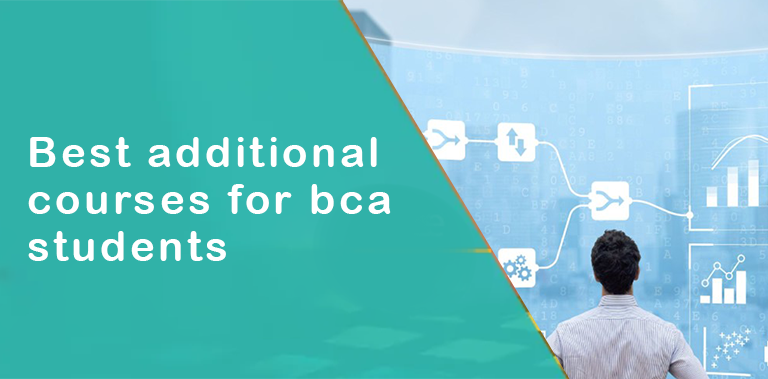
Arrange a Callback
Best additional courses for bca students
Bachelor of Computer Applications (BCA) is a popular undergraduate program for students who hope to build a career in information technology. While a BCA degree from a supposed BCA college in Haryana can provide a strong foundation in computer science and applications, adding certain additional courses can significantly improve your employability and skills. Whether you’re interested in data science, cybersecurity, advanced programming, or web development, taking these supplementary courses can give you an edge in your future career.
This comprehensive guide explores some of the best additional courses for bca students for BCA students, focusing on how they can increase your career opportunities and skills.
1. Advanced Programming Languages
While BCA programs cover primary programming languages, diving deeper into advanced languages can be highly beneficial. Courses in languages such as Python, JavaScript, C++, and Ruby offer a spirited edge:
- Python: Known for its simplicity and versatility, Python is widely used in data analysis, artificial intelligence, and web development. Advanced courses in Python can teach you about machine learning, data visualization, and automation.
- JavaScript: vital for web development, JavaScript courses can help you master front-end frameworks like React or Angular, as well as back-end technologies like Node.js.
- C++: An influential language in system/software development and game programming, C++ courses cover advanced topics such as memory management and object-oriented programming.
- Ruby: Known for its ease of use in web application development, Ruby on Rails courses can provide you with skills in building scalable web applications.
2. Data Science and Analytics
Data science is a fast-growing field that combines programming, statistical analysis, and domain knowledge. Courses in this area can equip BCA students with skills to analyze and interpret complex data:
- Data Analysis with Excel: Advanced courses can teach you to use Excel for data analysis, including functions, pivot tables, and VBA (Visual Basic for Applications) scripting.
- R Programming: R is a language designed explicitly for arithmetical computing and graphics. Courses in R can help you understand data manipulation, statistical analysis, and visualization.
- Machine Learning: Machine learning courses cover algorithms, data processing, and analytical modeling. Learning platforms like Coursera or edX offer specialized courses in this area.
- Big Data Technologies: Courses on Hadoop, Spark, and NoSQL databases can help you handle and analyze large datasets, vital in many data-driven industries.
3. Cybersecurity
Cybersecurity is essential for tech professionals with the increasing occurrence of cyber threats. Additional courses in cybersecurity can prepare you for roles in protecting information systems:
- Ethical Hacking: Courses in moral hacking teach you to identify vulnerabilities and secure systems against potential attacks. Certifications like CEH (Certified Ethical Hacker) can improve your credibility in the field.
- Network Security: Understanding network security protocols and practices is vital for safeguarding digital communication. Courses in this area cover firewalls, interruption detection systems, and encryption.
- Information Security Management: Learn about managing and implementing security policies, risk assessment, and fulfillment with standards such as ISO 27001.
4. Web Development
Web development skills are highly sought after, and additional courses can help you build healthy websites and applications:
- Front-End Development: Courses in HTML, CSS, and JavaScript are foundational. Advanced courses include frameworks like React, Vue.js, or Angular, which streamline the development of interactive user interfaces.
- Back-End Development: Learn server-side technologies and databases, including courses in Node.js, PHP, Ruby on Rails, or Python with Django.
- Full-Stack Development: Combining front-end and back-end skills, full-stack development courses provide a complete understanding of web application building.
5. Mobile App Development
With growing reliance on mobile devices, mobile app development is profitable. Courses in this area can help you develop apps for Android and iOS:
- Android Development: Courses cover Java/Kotlin programming, Android Studio, and app deployment on the Google Play Store.
- iOS Development: Learn Swift programming, Xcode, and app submission to the Apple App Store. Courses often include user interface design and performance optimization.
- Cross-Platform Development: Tools like Flutter or React Native allow you to build apps for both Android and iOS with a single codebase. Courses in these tools teach you how to create high-performance mobile apps.
6. Cloud Computing
Cloud computing is a necessary technology for modern IT infrastructures. Courses in cloud computing provide skills in managing cloud services and solutions:
- AWS (Amazon Web Services): Courses cover a variety of AWS services, including EC2, S3, and Lambda. Certifications like AWS Certified Solutions Architect can boost your resume.
- Microsoft Azure: Learn about Azure’s cloud services, including virtual machines, databases, and AI tools. Azure certifications are valuable for cloud-related roles.
- Google Cloud Platform (GCP): Courses in GCP cover cloud services, data storage, and machine learning tools. GCP certifications are beneficial for roles in cloud architecture and data engineering.
7. Software Development Life Cycle (SDLC)
Understanding the software development life cycle is vital for managing projects efficiently. Additional courses can teach you a variety of SDLC methodologies:
- Agile and Scrum: Learn about Agile project management principles and Scrum practices for iterative development and effective team collaboration.
- DevOps: Courses in DevOps focus on integrating development and operations for continuous delivery and automation. Learn about tools like Docker, Jenkins, and Kubernetes.
- Project Management: Courses in project management techniques, including PMBOK or PRINCE2, can help you manage software projects from conception to delivery.
8. UI/UX Design
User Interface (UI) and User Experience (UX) design courses focus on creating natural and visually appealing digital experiences:
- UI Design: Courses cover principles of designing user interfaces, including layout, colour theory, typography, and tool use (e.g., Adobe XD, Figma).
- UX Design: Learn about user research, wireframing, prototyping, and usability testing to create user-centred designs that enhance user satisfaction.
9. Artificial Intelligence (AI) and Robotics
AI and robotics are transforming industries across the globe. Courses in these fields provide insights into automation and intelligent systems:
- AI Fundamentals: Courses cover AI concepts, machine learning algorithms, neural networks, and their applications in various domains.
- Robotics: Learn about robotics programming, control systems, and robot design. Courses often include hands-on projects and real-world applications.
10. Business Intelligence (BI)
Business Intelligence courses focus on analyzing business data to support decision-making:
- BI Tools: Learn to use tools like Tableau, Power BI, or QlikView to create dashboards, reports, and data visualizations.
- Data Warehousing: Courses cover concepts of data warehousing, ETL (Extract, Transform, Load) processes, and data integration.
Conclusion
Adding supplementary courses to your BCA degree can significantly improve your career prospects. By exploring advanced programming languages, web development, data science, cybersecurity, mobile app development, cloud computing, SDLC, UI/UX design, AI, robotics, and business intelligence, you can gain specialized skills that set you apart in the job market. These courses help you stay spirited, adapt to industry trends, and open doors to varied career opportunities. Investing in these additional qualifications will equip you with the skills and knowledge needed to excel in the ever-evolving technology field.


